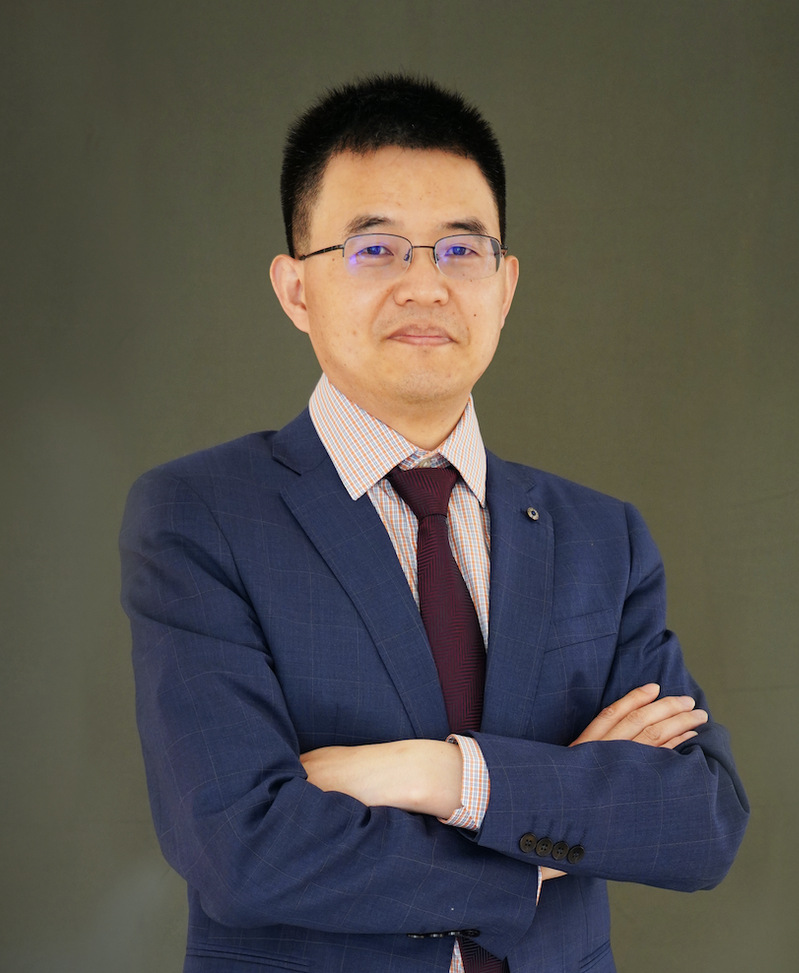何锋 研究员

何锋,Ph.D. (University of Oklahoma, USA), Post-Doc (UCSD), 研究员,博士生导师
Feng He, Ph.D. (University of Oklahoma, USA), Investigator, Master Mentor
电子邮箱(Email):fhe@shutcm.edu.cn
办公室电话(TEL):(021) 5132-2501
通讯地址(contact address):浦东新区蔡伦路1200号创新科技楼4楼A418
(A418, 4/F, Innovation and Technology Building, 1200 Cailun Rd, Pudong New district, Shanghai)
研究领域(Research area)
脂肪肝肝炎和肝癌的发病机制
Pathogenesis of fatty liver, hepatitis, and liver cancer
内质网应激/整合应激反应信号与疾病发生
Endoplasmic reticulum stress/ Integrated stress response signaling and disease
应激反应调节细胞器功能和细胞代谢及其炎症调控
Regulation of organelle function and cell metabolism as well as inflammation by stress response signaling
基于应激反应的靶点和中医药药理机制
Drug target of stress response signaling and pharmacology of Traditional Chinese Medicine
学术任职 (Academic appointments)
担任但任Frontiers in Oncology和Frontiers in Cell and developemental Biology客座主编;同时担任 Science Advances, Journal for ImmunoTherapy of Cancer, International journal of Cancer, Journal of Clinical Medicine, Cancers, Aging,Oncotarget, Cell Proliferation, Cells, Journal of Cellular and Molecular Medicine, Journal of Viral Hepatitis, Scientific Report, FEBS letters等杂志特邀审稿人或者审稿委员会成员。
Academic appointments
Served as guest editor of Frontiers in Oncology and Frontiers in Cell and developemental Biology; Specially invited reviewer or member of review board for journals such as Science Advances, Journal for ImmunoTherapy of Cancer, International journal of Cancer, Journal of Clinical Medicine, Cancers, Aging, Oncotarget, Cell Proliferation, Cells, Journal of Cellular and Molecular Medicine, Journal of Viral Hepatitis, Scientific Report, FEBS letters, etc.
基金主持(Grant Funding)
主持国家自然科学基金1项
1. 国自然面上基金:整合应激反应转录因子ATF4调控Slc7a11在肝癌发生中的效应机制(82172947),2022.01-2025.12,获55万资助,在研,主持;
2021年“中西医结合防治肿瘤临床与基础研究”上海市教委高峰高原学科专项拨款
Eli Lilly 科研创新奖 ATF4 在NASH 发病中的作用机制研究, 2016.10-2020.09
Grant Funding
Presiding over 1 National Natural Science Foundation of China (NSFC) fund
"Mechanism of integrated stress response transcription factor ATF4-induced Slc7a11 expression and its effects in liver tumorigenesis (2022.01-2025-12)
Shanghai Municipal Education Commission special grant for "Clinical and basic research on the prevention and treatment of cancers with integrative medicine" (2021)
Eli Lilly innovation fellowship award, “Role of ATF4 In The Pathogenesis Of Non-Alcoholic Steatohepatitis (NASH).” 2016.10-2020.09
论文发表(Publications)
He F*, Zhang P, Liu J, Wang RL, Kaufman RJ, Yaden, BC*, Karin M*. ATF4 suppresses hepatocarcinogenesis by inducing SLC7A11 (xCT) to block stress- related ferroptosis. Journal of Hepatology 2023, Mar 28; S0168-8278(23)00193-9. doi: 10.1016/j.jhep.2023.03.016. Online ahead of print. (* Corresponding author) (2022 IF: 30.086).
Wang Y, Guo H, He F*. Circadian disruption: from mouse models to molecular mechanisms and cancer therapeutic targets. Cancer and Metastasis Reviews 2023 Mar; 42(1):297-322. (* Corresponding author) (2022 IF: 9.2)
Jia F#, Yu Q#, Zhao L, Shen Y, Guo H*; He, F*. Sodium New Houttuyfonate Inhibits Cancer-Promoting Fusobacterium nucleatum (Fn) to Reduce Colorectal Cancer Progression. Cancers 2022 Dec 12; 14 (24): 6111. (* Corresponding author) (2022 IF: 6.5)
Wang R#, Liang L#, Matsumoto M, Iwata K, Umemura A*, He F*. Reactive Oxygen Species and NRF2 Signaling, Friends or Foes in Cancer? Biomolecules 2023 Feb 11;13(2):353. (* Corresponding author) (2022 IF: 6.0)
Jia F#, Yu Q#, Wang R, Zhao L, Yuan F, Guo H Shen Y*; He, F*. Optimized Antimicrobial Peptide Jelleine-I Derivative Br-J-I Inhibits Fusobacterium Nucleatum to Suppress Colorectal Cancer Progression Int J Mol Sci 2023 Jan 11;24(2):1469. (* Corresponding author) (2022 IF: 6.2)
Feng He#; Laura Antonucci#; Shinichiro Yamachika#; Zechuan Zhang; Koji Taniguchi; Atsushi Umemura; Georgia Hatzivassiliou; Merone Roose-Girma; Miguel Reina-Campos; Angeles Duran; Maria T. Diaz-Meco; Jorge Moscat; Beicheng Sun*; Michael Karin*; NRF2 activates growth factor genes and downstream AKT signaling to induce mouse and human hepatomegaly, Journal of hepatology (IF=25.1), 2020, 72(6): 1182-1195.
Feng He; Laura Antonucci; Michael Karin*; NRF2 as a regulator of cell metabolism and inflammation in cancer, Carcinogenesis (IF: 4.6), 2020, 41(4): 405-416.
Feng He #*,Xiaoli Ru#, Tao Wen*; NRF2-a transcription factor for stress response and beyond. International Journal of Molecular Sciences (IF: 5.9), 2020, 21(13), 4777.
Ju Youn Kim#; Feng He#; Michael Karin*; From Liver Fat to Cancer: Perils of the Western Diet. Cancers (IF: 6.6), 2021, 13(5).
Mei-Fei Yueh; Feng He; Chen Chen; Catherine Vu; Anupriya Tripathi; Rob Knight; Michael Karin*; Shujuan Chen; Robert H. Tukey*; Triclosan leads to dysregulation of the metabolic regulator FGF21 exacerbating high fat diet-induced nonalcoholic fatty liver disease. Proc Natl Acad Sci USA (IF: 11.2), 2020, 117 (49): 31259-31266.
Atsushi Umemura; Feng He; Koji Taniguchi; Hayato Nakagawa; Shinichiro Yamachika; Joan Font-Burgada; Zhenyu Zhong; Shankar Subramaniam; Sindhu Raghunandan; Angeles Duran; Juan F. Linares; Miguel Reina-Campos; Shiori Umemura; Mark A. Valasek; Ekihiro Seki; Kanji Yamaguchi; Kazuhiko Koike; Yoshito Itoh; Maria T. Diaz-Meco; Jorge Moscat*; Michael Karin*; p62, Upregulated during Preneoplasia, Induces Hepatocellular Carcinogenesis by Maintaining Survival of Stressed HCC-Initiating Cells, Cancer Cell (IF:27.04), 2016, 29(6) : 935-948.
Zhao P, Sun X, Chaggan C, Liao Z, In Wong K, He F, Singh S, Loomba R, Karin M, Witztum JL, Saltiel AR. An AMPK–caspase-6 axis controls liver damage in nonalcoholic steatohepatitis. Science (IF: 47.7), 2020, 367 (6478): 652-660.
Zhong Z, Liang S, Sanchez-Lopez E, He F, Shalapour S, Lin XJ, Wong J, Ding S, Seki E, Schnabl B, Hevener AL, Greenberg HB, Kisseleva T, Karin M. New mitochondrial DNA synthesis enables NLRP3 inflammasome activation. Nature (IF: 43.1), 2018, 560 (7717), 198-203.
Zhong Z, Umemura A, Sanchez-Lopez E, Liang S, Shalapour S, Wong J, He F, Boassa D, Perkins G, Ali SR, McGeough MD, Ellisman MH, Seki E, Gustafsson AB, Hoffman HM, Diaz-Meco MT, Moscat J, Karin M. NF-κB Restricts Inflammasome Activation via Elimination of Damaged Mitochondria. Cell (IF:31.4). 2016,164(5):896-9.